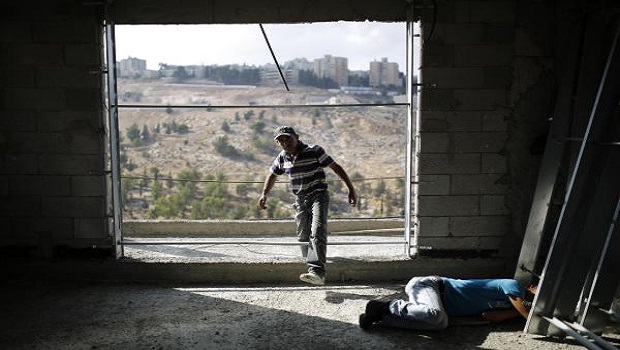
A Palestinian labourer works as another rests at a construction site in Pisgat Zeev, an urban settlement in an area Israel annexed to Jerusalem after capturing it in the 1967 Middle East war, August 12, 2013. REUTERS/Amir Cohen
Abbas said on Monday, during a meeting with German Foreign Minister Guido Westerwelle, that he was “committed to achieving just and comprehensive peace through negotiations, in order to achieve the aspirations of our people in establishing their independent state, with Jerusalem its capital.”
Palestinian chief negotiator Saeb Erekat had hinted at the possibility of boycotting the Jerusalem round of talks when he said: “The Palestinian side is seriously considering not participating in the negotiations,” without giving a definite decision.
This followed Israel’s announcement that it would build 1,200 settlement units in Jerusalem and the West Bank, in a step which embarrassed the Palestinians.
Israel has responded with little concern for the threats of a boycott. Spokesman for the prime minister’s office, Mark Regev, said the “housing plan which was ratified is within the area around Jerusalem and within the large settlement areas, which all fall inside the area which will remain under Israeli rule in any future peace treaty.”
Meanwhile, the BBC reported that US Secretary of State John Kerry urged the Palestinians not to react negatively and said the Israeli announcement was expected. The BBC added that Kerry stressed that Washington considered settlements “illegitimate.” This “underscores the importance of getting to the table quickly”, the BBC quoted Kerry as saying to reporters during a visit to Colombia.
The French news agency AFP on Monday urged both the Israelis and Palestinians “to avoid any actions that could undermine the resumption of peace talks after a three-year negotiating impasse.”
Michael Mann, the spokesman for European Union foreign affairs chief said “Israeli settlements in the West Bank are illegal under international law and threaten to make a two-state solution to the Israeli-Palestinian conflict impossible.”
In another development, US Chairman of the Joint Chiefs of Staff, Martin Dempsey, arrived in Israel on Monday for talks on military cooperation with his Israeli counterpart the Lt. Gen. Benny Gantz, Chief of General Staff of the Israeli Defense Forces.
Dempsey will also hold a meeting with Israeli Prime Minister Benjamin Netanyahu and Defense Minister Mosche Yalon to discuss developments in the region, including Iran’s nuclear program.
